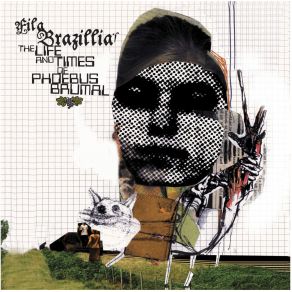The Life and Times of Phoebus Brumal
Download links and information about The Life and Times of Phoebus Brumal by Fila Brazillia. This album was released in 2004 and it belongs to Electronica, House, Jazz, Rock, Dancefloor, Dance Pop, Bop genres. It contains 14 tracks with total duration of 59:20 minutes.

|
|
|---|---|
| Artist: | Fila Brazillia |
| Release date: | 2004 |
| Genre: | Electronica, House, Jazz, Rock, Dancefloor, Dance Pop, Bop |
| Tracks: | 14 |
| Duration: | 59:20 |
| Buy it NOW at: | |
| Buy on iTunes $9.99 | |
| Buy on Amazon $7.99 | |
Tracks
[Edit]| No. | Title | Length |
|---|---|---|
| 1. | Platinum Spider | 3:20 |
| 2. | Underpuppy | 4:50 |
| 3. | B******t (featuring Papa V) | 5:10 |
| 4. | Existentialist Singalong (also Featuring Papa V) | 1:24 |
| 5. | Blowhole | 4:10 |
| 6. | Thatched neon | 5:09 |
| 7. | You Won_t Let Me Rock | 4:10 |
| 8. | La Boulangerie Digitale | 4:13 |
| 9. | Boca raton | 6:13 |
| 10. | Bantamweight werewolf | 1:03 |
| 11. | Madame Le Fevre | 4:36 |
| 12. | Romantic Adventure (featuring Dinji Brown) | 4:42 |
| 13. | Uberboff | 4:35 |
| 14. | The Kingdom of Sound (also Featuring Dinji Brown) | 5:45 |
Details
[Edit]After the imaginative but often leaden-sounding Jump Leads LP in 2001, Messrs. Cobby and McSherry applied their usual mastery of sound science to The Life and Times of Phoebus Brumal, an extraordinary set of music that starts out bouncing like Basement Jaxx but ends up revealing more stylistic and musical innovation than anyone else in the field of organic electronica. That these productions appear on what is apparently a concept album centering on the daftly named figure in the title shouldn't scare away any listeners (although fleeing would indeed be understood). Without a look at the liner notes, which apparently include excerpts from the diary of Mr. (or Mrs.) Brumal — but are actually nonsensical assemblages of words from artwork maestros Designers Republic — the only clues that this material forms a concept album are in the seamless, excellent transitions between tracks. The first two songs feature the type of spangly disco productions that Basement Jaxx made a specialty, although Cobby and McSherry's process of Brazilification adds innumerable subtleties to the sound, and the openers are only the launching pad for the dozen tracks to come that, together, comprise one of the strongest full-lengths in dance music this side of the millennium. A few vocals do intrude, although they're usually dispatched quickly and treated well by the production duo. Unfortunately, Papa V's feature on the third track is the one least worth hearing; Djinji Brown's pair of songs on the second side should have been front and center (although perhaps a different order wouldn't have suited any concept at work).